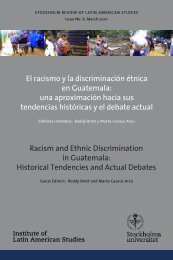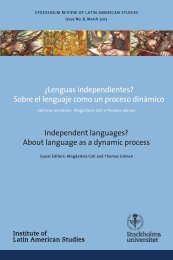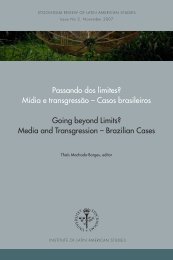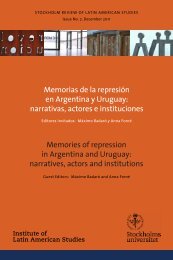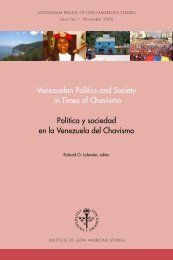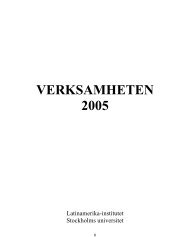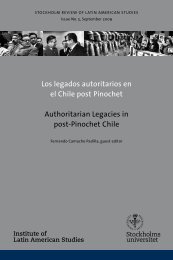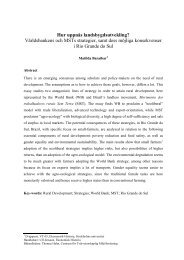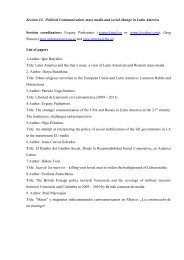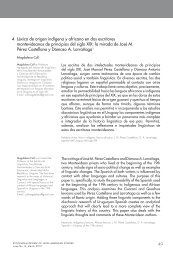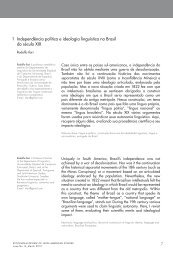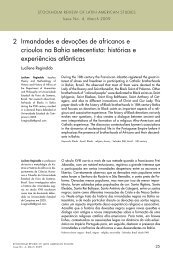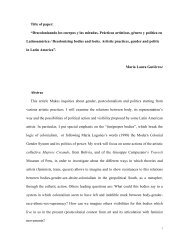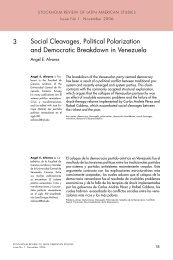Papers - Conference 2009 - Institute of Latin American Studies
Papers - Conference 2009 - Institute of Latin American Studies
Papers - Conference 2009 - Institute of Latin American Studies
Create successful ePaper yourself
Turn your PDF publications into a flip-book with our unique Google optimized e-Paper software.
such, its main function is to give room for a meeting place where discussions and changing <strong>of</strong>ideas can take place between its participants (WSF 2002).The heterogeneity <strong>of</strong> the WSF is quite different from earlier forms <strong>of</strong> civil society, whichwas organized within nations and distinguishably homogenous (Nash 2004: 437f). Similarlyto such observation, Boaventura de Sousa Santos argues that the WSF not only raises “[…]analytic and theoretical questions, but also epistemological questions” (2008: 250). Thisreflection poses questions to whether conceptual and theoretical tools available to social (andother) scientists <strong>of</strong> today are adequate to grasp what kind <strong>of</strong> phenomenon the WSF truly is.Nevertheless, what ever the definition may or should be, there is no doubt that the WSF is animportant part <strong>of</strong> the globalization from below; both as an example <strong>of</strong> what seems to be aparticipatory democracy (Teivainen 2002: 629) and as a global think tank for an alternativeworld.Food sovereignty: A way towards empowerment?Abdurazack Karriem argues, in his Gramscian analysis <strong>of</strong> MST, that“[…] to forge an alternative hegemony, counter-hegemonic movements needs to do more than simply resistthe dominant model: they have to develop alternative forms <strong>of</strong> production and reproduction or alternativeconceptions <strong>of</strong> nature-society relations” (2008: 3).According to Stedile, MST has an alternative proposal which is based on family-run and ruralagriculture and in which production <strong>of</strong> healthy food, freed from pesticides is prioritized(Stedile 2007: 51). Of central importance to the struggle for such alternative proposal is theconcept <strong>of</strong> “food sovereignty”, developed by La Via Campesina in the movements verybeginning (Borras Jr. et al. 2008: 190; La Via Campesina 2007). Stedile argues that sincerequired for human survival, food should not be considered a commodity on whichmultinational corporations make pr<strong>of</strong>its (Stedile 2004: 11). Neither MST nor La ViaCampesina is against trade in itself. However, they oppose the negotiations put forward byWTO in favor <strong>of</strong> agribusiness through agricultural liberalization, as well as the market ledagrarian reform (MLAR) program, launched by the World Bank. 11 In their oppositionalposition they define food as a basic human right (Karriem 2008: 7). As an alternative to thedominant neo-liberal agro export model embedded in the World Bank and IMF driven11 For relevant discussions on the MLAR, see Borras Jr. 2003 and Servolo de Medeiros 2007.7



